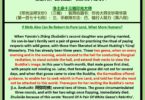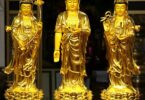◎ 明 • 鸡(蛇,猫,猴,雀,猪)
Míng [Dynasty]: Chickens ([And] Snake, Cat, Monkey, Sparrow, Pig)
【往生鸡 (1)】
[Reborn Chicken (1)]
明崇祯间,有吴雪崖者,为福州司理,生平虔奉佛法。
During [the years of] Míng [Dynasty’s Emperor] Chóngzhēn, [there] was [a] person [named] Wú Xuěyá, as Fúzhōu’s official in charge of lawsuits, [who for his] entire life, sincerely believed [in the] Buddha’s Dharma.
其地开元寺,僧多食肉,不守戒行。雪崖请示立石,以禁之。
[As] that land’s Kāiyuán Monastery’s monks mostly ate meat, not guarding precepts’ practices, Xuěyá asked for instructions [to] erect [a] stone [tablet], for prohibiting this.
[Note 1: Perhaps after receiving permission from the Abbot, the tablet was sponsored and erected as a prominent, constant and literally solid reminder, for the monks to always observe the precepts well.]
一日坐禅堂,有鸡作唱佛声。
One day sitting [in the] meditation hall, [there] was [a] chicken having chanting [of the] sound [of the] Buddha[‘s name].
[Note 2: The chicken was probably a human (or even monk), who already knew how to recite the Buddha’s name in his past life, who for some reason, did not practise to reach Pure Land in time, and was even reborn as an animal, yet with enough karmic affinity to reach the monastery.]
索得之,谓僧曰:「若辈谓寺中,久不养生物,如何有鸡?今观畜生,尚有佛性。汝剃染破戒,不及此君多矣。」
[After] searching [to] get him, [he] said [to the] monks, ‘If [your] contemporaries say [that in the] monastery within, [for] long [did] not rear live animals, how [can there] be [a] chicken? Now observing [this] animal, [he] still has Buddha-nature. You [are] shaved, [yet are] defiled [and] break precepts, not as good as this “gentleman” [by] much.’
[Note 3: The last two statements were made to remind the monks that even animals have Buddha-nature, that can be more clearly expressed, than some of the monks, who might not be as diligent as the chicken.]
寺僧始立誓斋戒。
[The] monastery’s monks [then] began [to] establish vows [to uphold] purification precepts [which include being veg(etari)an].
遂携养署中,恒念佛不辍。
[He] then brought [him to be] reared [in his] government office within, [with] constant recitation [of the] Buddha[‘s name] not ceasing.
后迁官过丹阳,送至海会庵中,以其为接众所,使远近生信也。
Later moving [his] office across [to] Dānyáng [county, he] sent [him] to Hǎihuì Monastery within, with him serving [at its] office [for] receiving [the] public, [to] enable [those from] far [and] near [to] give [rise to] Faith.
[Note 4: The chicken was tasked to inspire visitors to have Faith that all sentient beings have Buddha-nature, and to have Faith in mindfulness of Buddha.]
鸡至庵,即念佛立化,为建塔供焉。
[When the] chicken reached [the] monastery, immediately [with] recitation [of the] Buddha[‘s name, he] stood [and] departed. For [him, a] pagoda [was] built [for] offering there.
[Note 5: It is only with good practice, that the chicken was able to depart with such ease.]
【往生鸡 (2)】
[Reborn Chicken (2)]
又中州僧觉圆,发愿庐山东林寺斋僧,立关募缘。
Also, Zhōngzhōu’s monk Juéyuán gave rise [to the] aspiration [to go to] Mount Lú’s Dōnglín Monastery, [to offer] alms [to its] monks. [Thus, he] established [a] retreat [to] raise funds.
[Note 6: Funds for sponsoring the food were probably raised by hosting the retreat for a number of sponsoring participants.]
时护关僧,至华氏托钵回,有雄鸡随至中途,僧送还华氏,因闭其门,鸡从屋上飞出,追赴关所,旋绕不去,同立关三年。
Then, [when the] retreat-protecting monk reached [a] Huá family [to] seek alms [for the retreat] returned, [there] was [a] male chicken [who] followed [him] until midway, [whom the] monk sent back [to the] Huá family. Because its doors [were] closed, [the] chicken from [the] house above flew out, [and when] chased, went [to the] retreat’s place. Circumambulating [and] not leaving, together [with the] established retreat [for] three years.
[Note 7: As the chicken was reared by the family, he was returned to it. However, the chicken was determined to escape, and to follow the monk. The chicken was probably a human (or even monk) in his past life, who for some reason, was reborn as an animal, yet with enough karmic affinity to reach the monastery hosting the retreat above and the one below.]
后携往东林,为之受戒。
[He was] later brought to Dōnglín [Monastery], for him [to] receive [the] precepts.
[Note 8: Although unable to speak properly, animals invited to receive precepts can be taken to have done so if they were still and solemn throughout recitation of the precepts.]
大众上堂念佛,鸡辄随之。
[When the] great assembly ascended [to the] hall [to] recite [the] Buddha[‘s name, the] chicken always followed it.
[Note 9: Although unable to speak properly, animals can still sincerely and silently recite the Buddha’s name in their minds. They can be taken to be doing so if they were still and solemn amidst recitation sessions, being part of the group cultivation (共修).]
逾年斋僧缘毕,鸡即立化,瘗于寺傍。
Passing [a] year, [after a] monastic alms meal [was] completed, [the] chicken then stood [and] departed. [He was] buried at [the] monastery’s side.
[Note 10: It is only with good practice, that the chicken was able to depart with such ease.]
【往生蛇、猫、猴、雀与猪】
[Reborn Snake, Cat, Monkey, Sparrow And Pig]
又传载江西有听法蛇,庐州坐化猫,峡中有坐化猴,巢县柘皋镇有立化雀,黄大参庭翠,有放生坐化猪。
Also passed [down and] recorded [is that] Jiāngxī had [a] Dharma-listening snake. Lúzhōu [had a] sitting [and] departing cat. [Its] gorge within has [a] sitting [and] departing monkey. Cháo county’s Zhègāo town had [a] standing [and] departing sparrow. Huáng Dàcān’s courtyard’s garden had [a] life-liberated sitting [and] departing pig.
[Note 11: It is only with good practice, that these animals were able to depart with such ease.]
种种灵异,不可殚述。
[There are] all kinds [of] spiritual [and] extraordinary [phenomena, that] cannot [be] entirely narrated [here].
[Note 12: What recorded here is but the tip of the iceberg, of more similar accounts involving various kinds of animals.]
(唐宜之巾驭乘,净土晨钟)
(Táng Yízhī’s Jīn Driven Chariot, Pure Land’s Morning Bell)
【一念投诚,可生净土】
[With One Recitation Surrendering Sincerely, There Can Be Birth In Pure Land]
论曰:「五浊恶世,染心易炽,净德难成。」
[As a] commentary says, ‘[In this] Five Defilements’ Evil Age, [the] defiled mind [is] easily ablaze, [and] pure virtues [are] difficult [to] accomplish.’
[Note 13: The Five Defilements (五浊) are the (i) Kalpa’s Defilement (劫浊): which is this period when all kinds of corrupted phenomena (defilements below) increasingly gather, (ii) Views’ Defilement (见浊): which are wrong (and harmful), (iii) Afflictions’ Defilement (烦恼浊): which cause suffering due to attachment, aversion, delusion, arrogance and doubt (贪嗔痴慢疑), (iv) Sentient Beings’ Defilement (众生浊): which arises from Views’ Defilement and Afflictions’ Defilement mixing to give rise to sentient beings who are corrupted in body and mind, and (v) Lifespan’s Defilement (命浊): which is the ill effect of having shorter life (due to defilements above), that makes spiritual progress to Buddhahood without the Pure Land path difficult.]
故经言:「娑婆勇猛一日,胜于净土百年。」
Thus [does a] sūtra say, ‘[In this] Sahā [World with practice] courageous [and] powerful [for] one day, surpasses in Pure Land [for one] hundred years.’
[Note 14: Do see the ‘Related Article’ below for complete understanding of this.]
今以物类而较人类,抑又其难焉者矣。而一念投诚,三途解脱,物类且然,况于人乎。
Now with [all] kinds [of] animals then compared [with] humankind, moreover also [with] their difficulties, how [can] they [do so]? Yet [with] one recitation surrendering sincerely, [the] Three Paths [can be] liberated [from, with all] kinds [of] animals also thus, moreover for humans.
[Note 15: Even though it is extra difficult for animals, with their limited physical and spiritual capacities to learn and practise the Dharma, if they are still able to do so, such as by sincerely reciting the Buddha’s name even once, verbally or silently, this is surely practice especially courageous and powerful, with pure virtues being accomplished in the moment. With this, they too can reach Pure Land, to be liberated from the Three Paths of hell-beings (地狱众生), hungry ghosts (饿鬼) and animals (畜生). If even these animals can know the value of reaching Pure Land, and practise sincerely to do so, all the more should we humans follow their inspiring examples, to also do so.]
《净土圣贤录》:
(Record [Of] Pure Land’s Noble Sages):
续编卷四 • 往生物类第七
Continual Compilation: Fourth Scroll: Seventh [Section On] Reborn Kinds [Of] Animals
胡珽撰
Compiled [By] Hú Tǐng
Namo Amituofo : Translation and notes by Shen Shi’an
相关文章:
Related Articles:
难易偈
Verses On Difficulty And Easiness
https://purelanders.com/2020/12/31/verses-on-difficulty-and-easiness
在秽土比较容易修行吗?
Is Practice Easier In Defiled Lands?
https://purelanders.com/2019/05/31/is-practice-easier-in-defiled-lands






Q: The ‘easiest’ animal which can reach pure land is a parrot?
A: Mindfulness of Buddha is fundamentally at the mind level; not speech level. It is possible to parrot the Buddha’s name without the Three Provisions. Note the there is no parrot in the cases above, though they can make it too, as recorded in other cases, if mindful of Amituofo sincerely with the Three Provisions.